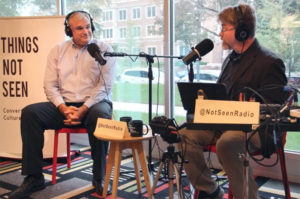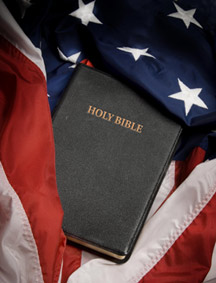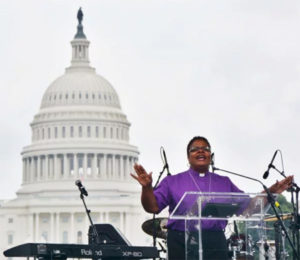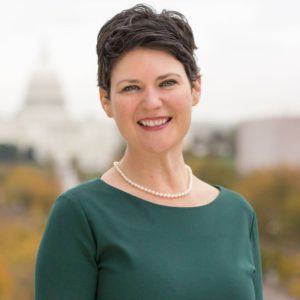Metaxas and Fea offer competing views on ‘Christian America’
CHICAGO (RNS)—The biggest reaction Eric Metaxas got from students at Judson University was when the school’s president introduced him as one of the writers and voices on VeggieTales.
Many Millennials grew up watching the popular Christian animated series. Metaxas co-wrote an episode called “Lyle the Kindly Viking” and narrated another on Queen Esther during one chapter in his eclectic career.
‘Very confusing’

A well-known talk radio host and the author of popular biographies of Dietrich Bonhoeffer and Martin Luther, he’s also written books for kids, including “God Made You Special,” featuring Bob the Tomato and Larry the Cucumber of VeggieTales.
And he wrote a forthcoming humor book, Donald Drains the Swamp, referring to President Trump, whom he has vocally supported.
“I want to stress to you that I’m very confusing,” he told students, smiling.
Metaxas was at Judson to talk about his book If You Can Keep It: The Forgotten Promise of American Liberty for the school’s annual Constitution Day chapel service.
As Benjamin Franklin was leaving Independence Hall after signing the Constitution, he was asked what kind of government they had created, Metaxas said.
“A republic, madam, if you can keep it,” was his reply, according to Metaxas.
“You’ve got to understand that the Constitution doesn’t keep itself,” he explained. “We the people have to understand it and keep it. We have to keep the republic. It’s up to us.”
Founders views on religion ‘nuanced’
Historian John Fea is skeptical of Metaxas’ views on American history and his support of the current administration. A couple of days before Metaxas spoke at Judson, Fea was in Chicago to talk about his new book, Believe Me: The Evangelical Road to Donald Trump, during a taping of the “Things Not Seen” podcast at a seminary bookstore on the University of Chicago campus.

Fea teaches American history at Messiah College, an evangelical school, and he rejects the idea—popularized by evangelical writers such as Metaxas and David Barton—that America was founded as a Christian nation. It’s important for evangelical Christians to see a different view of early American history from a fellow evangelical, he said.
“Because, you know, frankly, Barton and Metaxas especially are much more popular than people like me who are trying to push back,” he said.
The Founding Fathers’ view of religion was “much more nuanced and complex than people on the left and the right make it,” Fea insists.
Progressives are tempted to believe the Founding Fathers were all secular, didn’t care about religion or wanted everybody to be free of the matter of religion, he said in an interview with Religion News Service. On the other hand, conservatives see the country’s foundation as “uniquely Christian.”
In reality, he said, some of the founders were Christians, and some were not. John Adams, Thomas Jefferson and Benjamin Franklin would not have embraced “orthodox Christianity,” Fea said. However, they believed religion could be useful in a republic—that in order for a republic to work, one needed to sacrifice one’s own interests for the greater good.
 In writing the First Amendment, they wanted religion—all religion—to flourish. At the time, there were few non-Christians in America, he said. Even so, the Founding Fathers’ writings show they always saw it applying to Jews, Muslims, Hindus and people of other faiths and no faith, as well, he noted.
In writing the First Amendment, they wanted religion—all religion—to flourish. At the time, there were few non-Christians in America, he said. Even so, the Founding Fathers’ writings show they always saw it applying to Jews, Muslims, Hindus and people of other faiths and no faith, as well, he noted.
Views of America’s origins play a powerful role in today’s political climate, Fea said. Part of the idea of making America great again includes keeping America Christian.
‘God’s almost chosen people’
Much of Metaxas’ talk on his book “If You Can Keep It” centered on a similar idea—that the founders recognized virtue, faith and freedom as essential to keeping the republic. He made that point by referring to a quote attributed to Abraham Lincoln, calling Americans God’s “almost chosen people.”
“When God blessed America—and he has blessed us all these years—he didn’t do it to bless us. He did it to bless the whole world through us,” Metaxas said.
Metaxas, who declined an interview with RNS, also linked his ideas to current politics, expressing concern that government has been growing larger and “we’ve effectively been losing our freedoms.”
He encouraged each student to do his or her part, whatever that might look like, and explained what it means to “drain the swamp” of corruption and money, a popular Trump talking point.
The idea of being blessed to be a blessing resonated with some Judson students. Freshmen Arianna Wink and Madison Psinas said over lunch afterward they hadn’t learned in public school about the role religion may have played in the country’s founding, but they liked what Metaxas said about virtue and speaking up for what they believe.
“I haven’t grown up hearing a lot of politics mixed with religion,” said Psinas, who was one of a small group of students who had the opportunity to meet with Metaxas the day before.
“His discussion about compassion, living by example and being able to voice your opinion in this country was something we needed to hear in terms of feeling like we can really express ourselves and our faith.”




